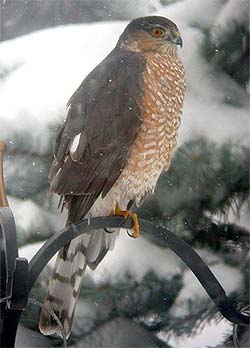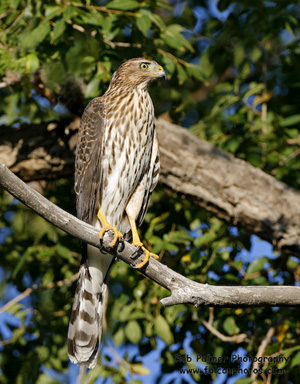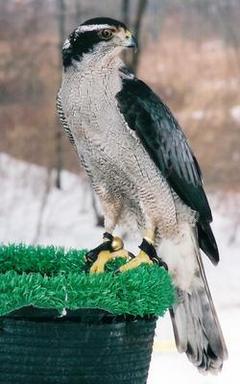Sharp-shinned Hawk (Accipiter striatus)

Description
- Slate gray above, pale below with rust colored barring
- Tail is squared in shape distinguishing it from the Cooper's Hawk
Size
- Length: 10-14" (35-35 cm)
- Wingspan: 21" (.5 m)
Range
- Forrests
- North to the tree-line south to South Carolina and Alabama in the east, and in the west Nicaragua.
- Winters north to Montana and New England
Diet
- Small birds, rodents, and insects
Voice
- "Kick-Kick-Kick"
- Shrill squeal when begging for food
Nesting
- Shallow platform of twigs 10-60 ft above ground
- Lay 4 dull white eggs with brown blotches
- Eggs incubate for 34-35 days and are tended by both parents
Cooper's Hawk (Accipiter cooperii)

Description
- Slate gray above, with fine rust barring below
- Tail is rounded at tip, distinguishing it from the Sharp-shin Hawk
Size
- Length: 14-20" (35-51 cm)
- Wingspan: 28" (.7 m)
Range
- Forests near meadows and clearings
- Southern Canada and all of the United States south as far as Florida, Texas and north-western Mexico
- Winters north to southern New England and British Columbia
Diet
- Medium-sized birds: starlings, robins, blackbirds, meadowlarks
- Chipmunks and squirrels
Voice
- "Cack-cack-cack-cack"
- Scream
- Nestlings: "tsee-ar"
Nesting
- Platform of sticks and twigs 10-60 ft above ground
- Lay 4 dull white brown-spotted eggs tended by the female
- Eggs incubate for 24 days
- Fledgelings leave the nest at 30-34 days after hatching
Goshawk (Accipiter gentilis)

Description
- Dark blue back, black crown, pale underside barred with gray
- White eyebrow streak is a distinguishing mark
- Immatures are brown above and streaked below
Size
- Length: 20-26" (51-66 cm)
- Wingspan: 42" (1.1 m)
Range
- Forrest, farmland, and woodland edges, though during winter can be seen in open country
- Alaska, Northern Quebec, and Newfoundland south to New England, Michigan, and New Mexico with sparse populations from the Appalachians to Maryland.
- Winters south to Virginia and Northern Mexico
Diet
- Medium-sized birds and mammals
Voice
- "Kak-Kak-Kak-Kak"
- Scream that rises then descends in pitch
Nesting
- Large platform of sticks lined with evergreen leaves in a tree 20-60 ft above ground
- Lay 3-5 pale blue eggs
- Eggs incubate for 36-38 days
- Fledgelings leave the nest at 45 days after hatching
|